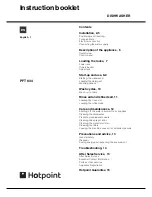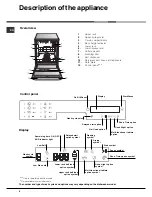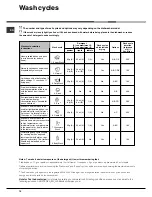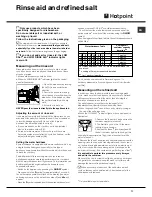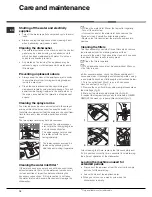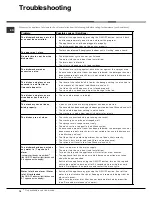
8
EN
Start-up and use
Measuring out the detergent
A good wash result also depends on the correct amount of
detergent being used; exceeding the stated amount does
not result in a more effective wash and increases
environmental pollution.
Only use detergent which has been specifically
designed for dishwashers.
DO NOT USE washing up liquid.
Using excessive detergent may result in foam residue
remaining in the machine after the cycle has ended.
To achieve the best results from each washing and
drying cycle, powder detergent, rinse aid liquid and salt
should be used.
Compartment A:
Washing detergent
Compartment B:
Pre-wash detergent
1. Open cover C by pressing button
D.
2. Pour in the detergent after
consulting the
Table of wash cycles
:
For powder detergent use
compartments A and B.
For detergent in tablet form: when
the cycle requires 1 tablet, place it in
compartment A and close the cover;
when it requires 2, place the second tablet at the bottom of the
appliance.
3. Remove detergent residues from the edges of the
compartment and close the cover until it clicks.
A
B
D
C
*
Only available in selected models.
The control panel features a Touch Control system;
press the symbols lightly with your fingertips to activate
the command.
The symbols in the key to wash cycles (to the left of
the control panel) DO NOT light up.
Wash cycles are selected by pressing the P symbol.
The machine has a buzzer/set of tones
(depending on the
dishwasher model)
to inform the user that a command has
been implemented: power on, cycle end, etc.
The symbols/indicator lights on the control panel/display
may vary in colour
(depending on the dishwasher model)
.
Starting the dishwasher
1. Turn the water tap on.
2. Press the
ON/OFF
symbol: the display lights up for a few
seconds, and the text
ON
appears.
3. Open the door and pour in a suitable amount of detergent
(
see Measuring out the detergent
).
4. Load the racks (
see Loading the racks
) and shut the door.
5. Press the
2
symbol to select the wash cycle in accordance
with the type of crockery and its soil level
(see
Table of wash
cycles).
6. Select the wash options* (
see options
).
7. Press the Start/Pause symbol; the Start symbol on the display
lights up. The wash cycle number, the symbols corresponding
to washing, any selected options and the time remaining until the
end of the cycle appear on the display.
8. Once the wash cycle has ended, its corresponding number
appears on the display, along with the text
END
. Switch off the
appliance using the
ON/OFF
symbol; the text
OFF
will appear
on the display. Shut off the water tap and unplug the appliance
from the electricity socket.
9. Wait for a few minutes before removing the crockery, in
order to avoid burns. Unload the racks, beginning with the
lower level.
- The machine will temporarily switch off automatically
during certain extended periods of inactivity, in order to
minimise electricity consumption.
AUTO WASH CYCLES
*
:
This model of dishwasher is
equipped with a special sensor which can be used to assess
the level of soiling and automatically select the most efficient
and economic wash cycle accordingly.
The duration of the auto wash cycles may vary due to the
operation of the sensor.
If the crockery is only lightly soiled or if it has been
rinsed with water before being placed in the dishwasher,
reduce the amount of detergent used accordingly.
Modifying a wash cycle in progress
If a mistake was made during the wash cycle selection process
it is possible to change the cycle, provided that it has only just
begun. To change the wash cycle, switch off the machine by
pressing and holding the
ON/OFF/Reset
symbol; the text
3-2-1
OFF
will appear on the display. Switch the machine back on
using the same symbol and select the wash cycle and any
desired options again.
Adding extra crockery
Press the Start/Pause symbol; the Pause symbol will light up.
Open the door, taking care to avoid the escaping steam, and
place the crockery inside the appliance. Press the Start/Pause
symbol again: the Start symbol lights up and the cycle is
resumed.
Press the Start/Pause symbol to pause the machine; the
wash cycle is stopped temporarily.
At this stage it is not possible to change the wash cycle.
Accidental interruptions
If the door is opened during the wash cycle, or if there is a
power cut, the cycle stops. It starts again from the point at
which it was interrupted once the door has been shut or the
electricity supply is restored.

